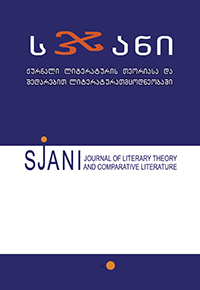The Epoch that Did Not Happen. The Poem of the Perished and Its Relationship to History
The Epoch that Did Not Happen. The Poem of the Perished and Its Relationship to History
Author(s): Jūratė Landsbergytė-BecherSubject(s): Language and Literature Studies, Studies of Literature, Lithuanian Literature
Published by: ლიტერატურის ინსტიტუტის გამომცემლობა
Summary/Abstract: The epoch of socialist realism has never come to Lithuania. In its place, nihilistic horror, war, Soviet and Nazi occupations began. With the return of the Soviets, realism became a warped time that became increasingly difficult to decode. The Overturning of the World is an accurate code of that era with its definitive history. The beginning of a new epoch in Lithuania exposed the tragedy of the occupation, which showed the essence of distorted concepts in its transformations. The realism of war and occupation slashed the romantic idealism of poetry: The obvious Antichrist, the mass-murder of the of nations – the occupant, the monster of anti-civilisation, the leader of the overturned world was named. It is how Lithuania colludes with the red apocalyptic Bolsheviks – Russia, the Western casuistry of stepping back from red lines and the final return to repentance. One poem in Lithuania best illustrates the turning of the world, before which even the author stumbles. In poetry, this era of occupations and the darkness of Sovietism in the 1940s comes as a plainsong with its culminating expression. It is so important to mention that poetry slips out of self-censorship into its highest breakthrough of Shakespearean tragedy, shaking the images of the occupants’ lies with the voice of truth. It is achieved with just one example – an exceptionally majestic phoenix bursting out of the lyric into the space of tragedy – a poem worthy of special researchers’ attention due to its dominant overshadowing of propaganda – the call of the fate of Lithuania – responding to the essence of the occupation. It is the poem “Vivos plango, mortuos voco” (1943-1944) by the writer and poet Vincas Mykolaitis-Putinas (1893-1967) (pen name Putinas means Viburnum).
Journal: სჯანი
- Issue Year: 2024
- Issue No: 25
- Page Range: 200-213
- Page Count: 13
- Language: English

